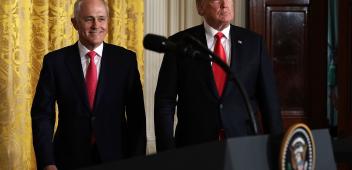Good fight for open economy must be fought again
This article was originally published in The Australian Financial Review.

Executive Summary
There's a folk tale that Australian economists like to tell ourselves. It's a lovely story. It goes like this:
In the 1970s Australia was a sclerotic industrial graveyard, with inefficient companies coddled behind impenetrable walls of protectionism. Economists, with the help of some brave and eloquent politicians, were able to break down these walls through advocacy, convincing the populace of the benefit of a more open economy. These benefits were realised quickly, and the compact ensuring a more open and flexible economy was secured, wrapped up tightly and not to be broken. Everyone lived happily ever after.
The story is substantially true. But the legacy is not necessarily secure.
This year's Lowy Institute Poll on the international attitudes of Australians, just released, bears that out.
One of the strongest results in the history of the poll concerns foreign investment. An astounding 69 per cent of Australians are strongly against the government allowing foreign companies to buy Australian farmland. Eighteen per cent are "somewhat against". Only 2 per cent are "somewhat in favour". I wonder how many economists are in that 2 per cent!
That's more isolationist than in 2012, when the poll asked a similar question, perhaps as a result of the political controversy over the future of various agricultural holdings such as the S. Kidman & Co cattle company sale.
The Kidman sale was blocked by Treasurer Scott Morrison, saying it wasn't in the national interest. While I, and others, don't think that statement passes muster, there is no doubt Morrison is on to a political winner. And in an election year!
Why such opposition to foreign investment in farmland? It's not as if they can take it out of the country! Perhaps people are worried that the foreign companies would be making the profits from the land. Well, if the land is so profitable, why aren't locals lining up to purchase it? We've seen the headlines about the difficulties some dairy farmers face. If foreigners are willing to pay to expose themselves to that risk, why shouldn't we let them?
Foreigners can provide the capital to help maintain the industry so that it thrives in the future. Such foreign investment has been vital to many industries in Australia, so it's not clear why agriculture should be any different.
The Lowy Poll provides more uncomfortable reading for economists. Seventy per cent of Australians support building our new submarines in Australia.
That's good news for Malcolm Turnbull, as the Coalition decided that the subs would be built here. At the time, many thought that this was just a sop to some electorates in Adelaide, but 70 per cent support indicates that the Coalition can expect larger political dividends than that.
At the announcement, Turnbull noted that it was "a great day for Australia's 21st century economy", coining the mantra "Australian built, Australian jobs, Australian steel, here right where we stand". One may retort that steel is not the picture we have in mind of an agile 21st century economy, but let's not get bogged down in that.
The problem is that the mantra appeals to some old protectionist instincts. We learnt the hard way that these instincts are poor. Surely we aren't being seduced by that siren song again.
There is a more sophisticated argument for building the subs here. Perhaps building them here allows us to develop expertise which we will need during times of military stress. If the subs need to be repaired, having the expertise on shore provides insurance.
As a theoretical proposition that's fine, but it needs to be supported by facts. Is that what are we are actually getting? That's not clear, but a hint may have been provided by the French, where the company charged with building the submarines is based.
The Economist reported that one man who helped lead the bid suggested that while much of the "steel bashing" will happen in South Australia, "hundreds of high-end jobs for French designers, instructors, engineers and others are now secured in places like Cherbourg". That doesn't sound like building up vital expertise in Australia to me.
The upshot of all this? It looks like the tale Australian economists tell is at best incomplete. We did not sell the benefits of open markets so that the Australian public are permanently convinced. Far from it. The stunningly strong results on foreign investment in farmland make that clear.
The fight needs to be fought again. And it would be terrific if we could find a few political allies to help make the case.


